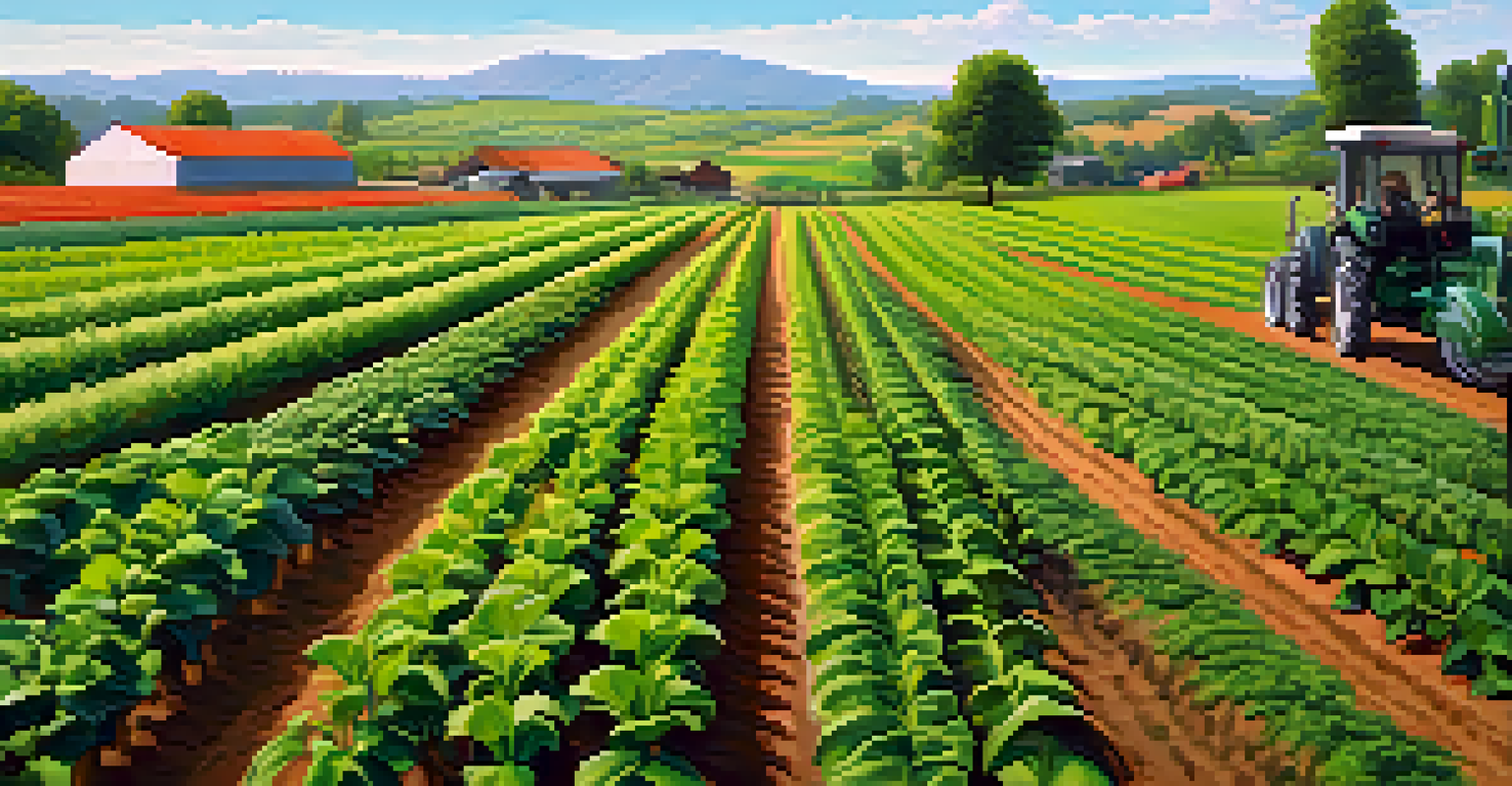Veganism: A Pathway to Enhanced Food Security for All

Understanding Veganism and Food Security
Veganism is a lifestyle choice that excludes all animal products, focusing instead on plant-based foods. This choice has gained popularity, not just for ethical reasons, but also for its potential benefits to food security. Food security means having reliable access to a sufficient quantity of affordable, nutritious food, which is a growing concern globally.
The future will be about plant-based diets and sustainable eating practices.
By shifting towards a vegan diet, we can utilize agricultural resources more efficiently. Plant-based foods typically require less land, water, and energy compared to livestock farming. This efficiency can lead to a more sustainable food system, ultimately benefiting communities struggling with food shortages.
Moreover, a vegan diet can help combat climate change, which poses a significant threat to food security. Reducing the consumption of animal products can lower greenhouse gas emissions, preserving arable land and water resources, and helping to ensure future generations have access to adequate food supplies.
The Environmental Impact of Veganism
Adopting a vegan lifestyle can significantly reduce one's carbon footprint, making it an appealing option for environmentally conscious individuals. Agriculture, especially animal farming, is a major contributor to environmental degradation, deforestation, and biodiversity loss. By reducing the demand for animal products, we can help protect our planet.

Transitioning to plant-based diets can also preserve water resources. For instance, producing one pound of beef requires around 1,800 gallons of water, while growing vegetables and grains uses considerably less. This conservation of water is essential, especially in regions facing drought and water scarcity.
Veganism Enhances Food Security
Adopting a vegan diet can improve food security by utilizing agricultural resources more efficiently and reducing reliance on animal farming.
Additionally, veganism can promote biodiversity by allowing more land to be used for growing diverse crops instead of monoculture animal farming. This diversity not only supports ecosystem health but also enhances resilience against pests and diseases, contributing to a more stable food supply.
Economic Benefits of Plant-Based Diets
Economically, embracing veganism can lead to cost savings for individuals and families. Plant-based foods like beans, lentils, rice, and seasonal vegetables are often more affordable than meat and dairy products. This affordability can help low-income families access nutritious food options without breaking the bank.
We cannot solve our problems with the same thinking we used when we created them.
Moreover, investing in plant-based agriculture can create jobs in farming, food processing, and distribution. As demand for vegan products grows, so does the opportunity for economic development in these sectors. Supporting local plant-based farms can stimulate local economies and promote food sovereignty.
In the long run, reducing reliance on animal agriculture can alleviate the economic burden of healthcare costs associated with diet-related diseases. A healthier population contributes to a more productive workforce, ultimately enhancing economic stability and growth.
Cultural Perspectives on Veganism
Cultural perceptions of veganism vary around the world, and understanding these differences is key to promoting food security through plant-based diets. In some cultures, plant-based diets are traditional and have been practiced for generations. By tapping into these traditions, we can foster a more inclusive approach to food security.
Education plays a crucial role in shifting perceptions about veganism. By sharing knowledge about the benefits of plant-based diets and culturally relevant recipes, communities can feel more connected to this lifestyle choice. This connection can help dismantle stereotypes and encourage broader acceptance.
Environmental Benefits of Veganism
Transitioning to plant-based diets significantly reduces carbon footprints and conserves water, aiding in the fight against climate change.
Additionally, incorporating local ingredients and flavors into vegan recipes can make the transition more appealing. When food reflects cultural heritage, it can facilitate discussions about nutrition and food security, making veganism a viable option for diverse populations.
Veganism and Global Hunger Issues
Global hunger remains a pressing issue, with millions facing food insecurity daily. By promoting a vegan diet, we may be able to address some of the root causes of hunger. Plant-based diets can be more efficient in producing calories and nutrients, making them a viable solution for food-insecure regions.
Food distribution systems also benefit from plant-based agriculture. Crops can be grown closer to where they are consumed, reducing transportation costs and preserving freshness. This local approach can enhance food security by providing communities with immediate access to nutritious options.
Additionally, veganism encourages innovative agricultural practices, such as permaculture and regenerative farming, which can restore degraded lands and increase food production. These methods not only address hunger but also promote sustainable practices that benefit the environment.
The Role of Policy in Promoting Veganism
Government policies play a significant role in shaping dietary habits and food systems. By implementing policies that support plant-based agriculture, governments can encourage more people to adopt vegan diets. This could include subsidies for farmers growing fruits and vegetables or funding for educational programs about plant-based nutrition.
Incentivizing local food systems can also enhance food security while promoting veganism. Supporting farmers' markets and community-supported agriculture (CSA) programs can help ensure that communities have access to fresh, affordable produce. These initiatives foster community engagement and strengthen local economies.
Economic Gains from Plant-Based Diets
Embracing veganism can lower food costs for families while stimulating local economies through the growth of plant-based agriculture.
Furthermore, public health campaigns that promote plant-based diets can raise awareness about the benefits of veganism. By highlighting the connection between diet, health, and food security, such campaigns can inspire individuals to make healthier choices that benefit both themselves and the planet.
Challenges of Transitioning to Veganism
While the benefits of veganism for food security are clear, transitioning to a plant-based diet can present challenges. Accessibility to affordable vegan options can be a barrier, especially in food deserts where fresh produce is limited. Addressing these accessibility issues is vital for promoting widespread adoption of veganism.
Additionally, there can be cultural resistance to changing traditional diets, which often include animal products. Overcoming this resistance requires sensitivity and a focus on inclusivity, ensuring that cultural practices are respected while promoting the benefits of plant-based eating.

Lastly, misinformation about veganism can hinder its acceptance. Education is key to dispelling myths and misunderstandings. By providing accurate information about nutrition, sustainability, and food security, advocates can encourage more people to explore veganism as a viable option.
The Future of Veganism and Food Security
Looking ahead, the potential for veganism to enhance food security is promising. As awareness of climate change and food shortages grows, more people are becoming interested in sustainable eating practices. This shift can lead to greater demand for innovative vegan products and solutions.
Technological advancements in food production, such as lab-grown meat and alternative protein sources, may also play a role in transforming the food landscape. These innovations can complement plant-based diets, offering diverse options that appeal to a wider audience.
Ultimately, a collective effort is needed to promote veganism as a pathway to enhanced food security. By working together—governments, communities, and individuals—we can create a more sustainable and equitable food system that benefits everyone.